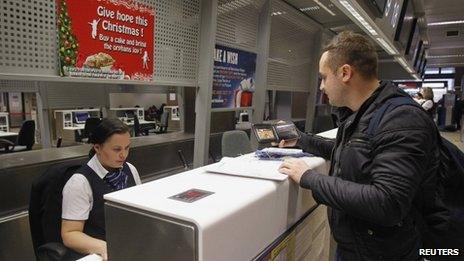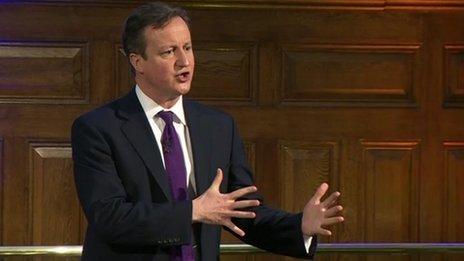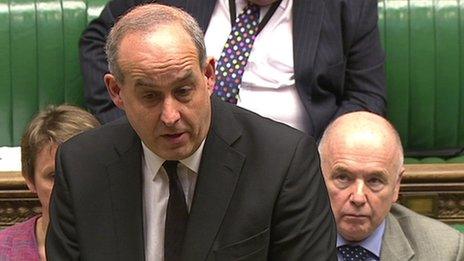David Cameron says EU immigration at 'reasonable level'
- Published

The number of migrants likely to come to the UK has been disputed
David Cameron has said the numbers of Romanians and Bulgarians arriving in the UK since the last work curbs were lifted are at a "reasonable level".
The prime minister made the comment as he urged Tory MPs not to endanger his plans to restrict immigration, telling the BBC he shared their "frustration".
The prime minister said the Immigration Bill, external contained "sensible" measures aimed at lowering annual net migration.
Rebels want the bill to impose controls on Bulgarians and Romanians until 2018.
Transitional arrangements limiting the work that Bulgarians and Romanians can do in the UK, in place since they joined the EU in 2007, expired on 1 January.
The BBC's political editor Nick Robinson said the prime minister had appeared to give his verdict on the numbers coming to the UK from the two countries following warnings last year of a possible "invasion".
'Paused'
But he said MPs were more concerned about the number of arrivals over a long period and wanted Mr Cameron to add new restrictions to the government's Immigration Bill, which is returning to the Commons on Thursday.
The prime minister, who is facing a potential rebellion, told BBC Radio 4's Today programme that his hands were tied over the issue as the UK had already extended the controls to the maximum seven years.

Mr Cameron says proper immigration controls are an absolute necessity
"Those seven years are now up," he said. "We are not allowed to extend them further under the current rules... we have done the extent of what we can do within the rules that were agreed by the last government."
Mr Cameron suggested the bill had been "paused" to reflect on the initial response to the end of Bulgarian and Romanian controls and he now wanted to press ahead with the legislation.
"I think we can now see at the start of the year so far there looks to be a reasonable level of migration and I hope we can make progress with the bill because it does so many good things."
Speaking later at a business event in London, Mr Cameron said he had not had access to any official or unofficial statistics and had based his comments on what he had "read, seen and heard" over the past few weeks.
The UK Independence Party criticised the remarks, saying they were based on "zero evidence".
'Real concerns'
While net migration - the difference between the number of people settling in the UK and those leaving - is a third lower than in 2010, Mr Cameron says he wants to see it fall further.
"I completely understand and, in many ways, share the frustration of colleagues who would like us to go further," he told the BBC.
The bill, he insisted, contained important measures to ensure migrants had to pay to use the NHS and could not get council housing or defer appeals against deportation judgements if they were not entitled to be in the UK.
Nick Robinson said he expected the government to table amendments which would put in place much tougher controls on migration from countries that join the European Union in future.
The prime minister has also hinted that future controls would stay in place until aspiring EU members reach an average income level much closer to that of the UK and other existing EU members.
Speaking on Sunday, Conservative MP Nigel Mills said he and his colleagues did not want to "crash" the bill but he wanted further "limited and proportionate" action.
"Absolutely the last thing I want to see is this bill go down but I think we do need to set out very clearly that we have real concerns about the level of EU immigration and that something needs to start being done."

Mr Hanson said there was a "cross-party consensus" on future EU accessions
Shadow Home Office minster David Hanson said Labour would support a group of amendments aiming to enable the government to impose further transitional immigration controls on future EU accession countries.
"Today, on behalf of the official opposition, I have signed new clauses 7, 8, 9 and 10, tabled by the honourable member for Sleaford and North Hykeham [Conservative Stephen Phillips] and several Conservative backbenchers, which will look at strengthening future accession agreements in to the EU when they come about," he said, during Home Secretary Theresa May's Commons question session on Monday.
"Given that new cross-party consensus, will the home secretary join us in supporting those amendments and new clauses on Thursday?"
Mrs May responded: "He will have to wait and see what happens on Thursday, but I have looked at interest at the amendments which have been tabled."
She told MPs she was "pleased to see that there is indeed agreement across this House that we do need to take action in future in relation to accession countries".